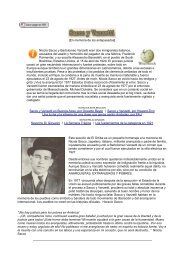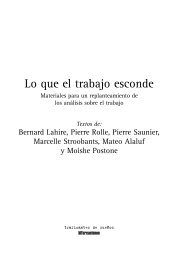The Invisible Man by H G Wells
The Invisible Man by H. G. Wells - Papeles de Sociedad.info
The Invisible Man by H. G. Wells - Papeles de Sociedad.info
Create successful ePaper yourself
Turn your PDF publications into a flip-book with our unique Google optimized e-Paper software.
"But I went to work—like a slave. And I had hardly worked and thought about the matter six<br />
months before light came through one of the meshes suddenly—blindingly! I found a general<br />
principle of pigments and refraction—a formula, a geometrical expression involving four<br />
dimensions. Fools, common men, even common mathematicians, do not know anything of what<br />
some general expression may mean to the student of molecular physics. In the books—the books<br />
that tramp has hidden—there are marvels, miracles! But this was not a method, it was an idea, that<br />
might lead to a method <strong>by</strong> which it would be possible, without changing any other property of<br />
matter—except, in some instances colours—to lower the refractive index of a substance, solid or<br />
liquid, to that of air—so far as all practical purposes are concerned."<br />
"Phew!" said Kemp. "That's odd! But still I don't see quite ... I can understand that there<strong>by</strong> you<br />
could spoil a valuable stone, but personal invisibility is a far cry."<br />
"Precisely," said Griffin. "But consider, visibility depends on the action of the visible bodies on<br />
light. Either a body absorbs light, or it reflects or refracts it, or does all these things. If it neither<br />
reflects nor refracts nor absorbs light, it cannot of itself be visible. You see an opaque red box, for<br />
instance, because the colour absorbs some of the light and reflects the rest, all the red part of the<br />
light, to you. If it did not absorb any particular part of the light, but reflected it all, then it would be<br />
a shining white box. Silver! A diamond box would neither absorb much of the light nor reflect much<br />
from the general surface, but just here and there where the surfaces were favourable the light would<br />
be reflected and refracted, so that you would get a brilliant appearance of flashing reflections and<br />
translucencies—a sort of skeleton of light. A glass box would not be so brilliant, not so clearly<br />
visible, as a diamond box, because there would be less refraction and reflection. See that? From<br />
certain points of view you would see quite clearly through it. Some kinds of glass would be more<br />
visible than others, a box of flint glass would be brighter than a box of ordinary window glass. A<br />
box of very thin common glass would be hard to see in a bad light, because it would absorb hardly<br />
any light and refract and reflect very little. And if you put a sheet of common white glass in water,<br />
still more if you put it in some denser liquid than water, it would vanish almost altogether, because<br />
light passing from water to glass is only slightly refracted or reflected or indeed affected in any way.<br />
It is almost as invisible as a jet of coal gas or hydrogen is in air. And for precisely the same reason!"<br />
"Yes," said Kemp, "that is pretty plain sailing."<br />
"And here is another fact you will know to be true. If a sheet of glass is smashed, Kemp, and beaten<br />
into a powder, it becomes much more visible while it is in the air; it becomes at last an opaque<br />
white powder. This is because the powdering multiplies the surfaces of the glass at which refraction<br />
and reflection occur. In the sheet of glass there are only two surfaces; in the powder the light is<br />
reflected or refracted <strong>by</strong> each grain it passes through, and very little gets right through the powder.<br />
But if the white powdered glass is put into water, it forthwith vanishes. <strong>The</strong> powdered glass and<br />
water have much the same refractive index; that is, the light undergoes very little refraction or<br />
reflection in passing from one to the other.<br />
"You make the glass invisible <strong>by</strong> putting it into a liquid of nearly the same refractive index; a<br />
transparent thing becomes invisible if it is put in any medium of almost the same refractive index.<br />
And if you will consider only a second, you will see also that the powder of glass might be made to<br />
vanish in air, if its refractive index could be made the same as that of air; for then there would be no<br />
refraction or reflection as the light passed from glass to air."<br />
"Yes, yes," said Kemp. "But a man's not powdered glass!"<br />
"No," said Griffin. "He's more transparent!"<br />
"Nonsense!"<br />
"That from a doctor! How one forgets! Have you already forgotten your physics, in ten years? Just<br />
think of all the things that are transparent and seem not to be so. Paper, for instance, is made up of<br />
transparent fibres, and it is white and opaque only for the same reason that a powder of glass is
















